EasyJet has announced plans of carrying out tests of a hybrid hydrogen fuel system that has been developed in collaboration with students at Cranfield University and is capable of saving 55,115 tons of fuel per year while cutting down on CO2 emissions. The system will recover energy during the braking that follows after a plane landing.
The principle employed is quite similar to the regenerative braking systems that are being used in automobiles today. The hydrogen fuel cell shall make use of the energy, gained by the plane while it applies brakes, for the charging of batteries located on the aircraft. These batteries can then be made use of later on to meet part of the plane’s power requirements. The waste water produced as a by-product of the process can also be recycled into the plane’s water system.
The company suggests that the energy thus recovered can be used instead of 4% of fuel that is consumed by the plane while taxiing. As per theory, aircraft can be fitted with motors in their main wheels, thus allowing the pilots to gain control of speed, direction and braking. This could potentially take out tugs that are currently used for maneuvering aircraft to and fro stands. The company has been working on energy-efficient ways of taxiing for quite some time now.
The firm claims that its average passenger’s carbon footprint is 22% less when compared with any other airlines and it is aiming at a further reduction of 7% by 2020. The company’s work with Cranfield University is the result of a 3-year strategic partnership agreement for sharing of knowledge and innovation that was signed last year. There are many other ideas in the pipeline as well.
As of now, EasyJet is working in tandem with suppliers and industry partners for the development of hybrid technology and shall be testing it later this year.
